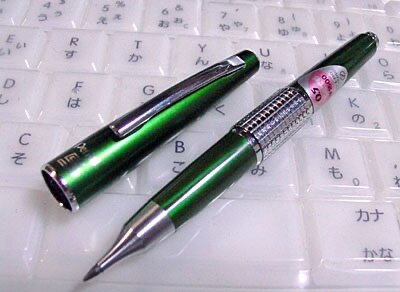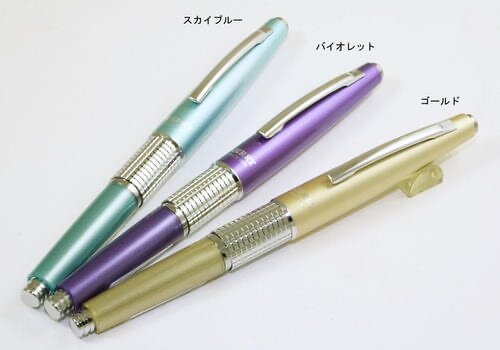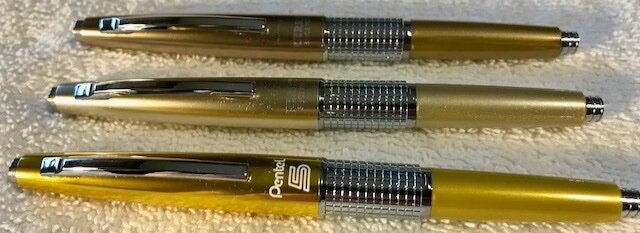Search the Community
Showing results for tags 'pentel kerry'.
-
 Although I own many mechanical pencils, just about each of them was purchased as part of a set with a fountain pen; the pencil was an afterthought for me. In the past few months, I have come to appreciate one model of mechanical pencil that I have sought for its own sake -- the Pentel Kerry P1035 and P1037 models (hereafter “PK”). As I will show you, these PK models have a fountain pen appearance, in that they have a click-on cap that covers the writing end of the pencil in a flush manner to protect shirt pockets and to give the pencil an elegant look. The PK comes in a variety of colors and trims, making it highly collectible, and it is a durable and reliable pencil. Here's a photo of three PKs (from top to bottom): posted (black); cap off (purple); cap on (green). The varieties of the PK can be distinguished in different ways. Regardless of the varieties, each is of the same dimensions and weight. Weight is approximately 20-21 grams. Length capped is approximately 12.5 cm (4.875 in), and length with the cap posted is approximately 13.5 cm (5.25 in). The internal knock mechanism that contains the lead is made of brass. The external materials vary somewhat, depending on model number, as some trim is gold-plated and some stainless steel and/or chrome-plated, and there are a few special/limited editions that feature a unique pattern and/or color on the central band of the PK. First released in 1971, there are two major logo variations on the cap that are determined by the age of the PK. The pre-2011, original line of PKs, near the bottom of the caps, features the inscription, “Pentel 5,” whereas the newer line features the inscription “Kerry, Since 1971.” Here are a new (B) and old (BNA) red models -- same color scheme but different logos on the cap. I happen to like the look of the "Pentel 5" logo, compared with the more "corporate" "Kerry, Since 1971" logo. In a few cases, the exact same color was released in an old (“Pentel 5”) and a new (“Kerry, Since 1971”) version. This is the case with the silver-chrome, black-chrome, blue-chrome, light-blue/chrome, and red-chrome versions (one old and two new versions). All but two models are numbered P1035 for 0.05 mm lead, and two numbered P1037 for 0.07 mm lead. One model using 0.05 mm lead is not numbered as a P1035; that is the “Craft Design Technology” (CDT) special edition, which is numbered as PEPH3-038W. Here are two photos of a disassembled black PK, so you can see all the parts: A very cool aspect of the PK is shown in the photo. With the cap off, the barrel’s end-piece is removable so that lead can be inserted in the rear. That end piece can be clicked to advance the lead. When the cap is posted, it has its own separate, removable end-piece which, when removed, reveals an eraser. Replacement erasers for the PK are Pentel’s Z2-1N Refill Erasers. Another feature that is found on the oldest models is shown here; the end-piece of the barrel in these oldest models feature a thin metal piece that can be placed into the point to clear away any lead stuck there. At some point, Pentel abandoned this feature. It came in handy for me when I needed to clear some stuck lead from a model that didn’t have the feature; I used an older model’s metal piece to clear the lead from the newer model’s point. I’ve only had that problem once. Now to the wide variety of colors-trims. There are two “demonstrator” models, the XNA and the ZNA, pictured below. The XNA is known as the “Gold Skeleton” and is a “Za Za City” Limited Edition. The ZNA is known as the “Silver Skeleton” and is a “Tokai Region” Limited Edition. Both pre-date 2011, as they have the “Pentel 5” logo on their caps. Continuing with the “precious metals” look, there are two other editions. The ZXKS is known as the “Silver and Gold Legend” Limited Edition. The ZKS and the ZD have a silver-and-chrome appearance, the ZKS being another “Legend” Limited Edition, and the ZD being the newer, “Kerry, Since 1971” version. Any model with a “KS” as part of its model number designates a special edition commissioned by Kitera Shouji Stationary Company in Japan. There are three models in black that are special editions. The AHZ is a one-of-a-kind black model with its own unique black center band; it is known as the "Tokyu Hands" special edition, and is hard to find. The other two black special editions are gold-plated models. The AXKS is known as the “Phantom” and is black with gold-plated center band and trim. The XAD is the newer version of the Phantom model. Other pre-2011 “Pentel 5” models are pictured below (sometimes along with their post-2011 versions, model numbers going from top to bottom in such a combined photo): Blue (I call it "medium blue" -- models C and CD) Black (models A and AD) Green (a nice, rich, medium emerald green color -- model D) Brown (some call it "copper-brass-orange" -- model E) above a Bordeaux (model DB) Medium Turquoise (model CNA) above a Dark Turquoise (model DC, sometimes referred to as a "dark blue," but truly a dark teal color) Yellow (model GKS) In 2011, Pentel issued three 40th Anniversary models (from top to bottom) -- the SD (Light Blue), VD (Violet), and XD (Champagne Gold). Although one can readily find the light blue and champagne gold versions on Ebay, I have not seen a VD anywhere for sale. The shade of violet in the VD is somewhat a blue-violet, compared with a later model, the VKS, which is somewhat a red-violet. I'll show the comparison below in a bit. In 2021, Pentel issued four 50th Anniversary models, each with gold-plated band and trim (from top to bottom) -- the ANNO (Dark Taupe, but called “Traditional Grey”), ANEO (Dark Brown), ANC (“Bottle Blue,” which looks dark purple in some lighting conditions), and the AND (“Glass Green”). These are readily available from a variety of Ebay sellers, mostly in Japan. Notice that the ANNO and the ANEO feature a rose gold tint on the band and trim, whereas the ANC and AND have regular gold tint. These are gorgeous instruments, and the ANC and AND models have somewhat translucent bodies. The CDT model mentioned earlier is shown here. The CDT stands for "Craft Design Technology," and has a unique trim and band to go with its white body. Between the 40th and 50th Anniversary editions, there were other colors issued: ZD (Silver/Chrome reissue) Bronze Gold (XD2, top), compared with Champagne Gold (40th Anniversary) & Yellow (shown above) Metallic Grey (N) over Smokey Grey (ND). Some believe there is no difference, and there's only one model, but I'm not so sure, as I've purchased each from Ebay from sellers using the different model letters. CC (Navy Blue) KD (Olive Green) -- two views, lighting dependent? I have a few and their color is something in-between these photos. I would call it a "light-green-olive." KD2 (Khaki) FD (Orange) PKS (Dark Pink) PD (Light Pink) VKS (Purple) over the very rare VD (Violet) to show comparison. The VKS is a red-purple, while the VD is a blue-violet. Not shown again: XAD (the black-and-gold Phantom reissue); C (Medium Blue reissue); SD (Light Blue reissue, shown with 40th Anniversary models); A (Black reissue); and BKS and B (Red). I just saw today on Ebay a newest model, the AMKS, a model with an “Amber” color and chrome/SS trim and band. Per this photo, this looks a lot like the Bronze Gold, but it does have a different model #. I just ordered four of them, so I'll let you know. The two models taking 0.07 mm lead are the A (Black) and C (Navy Blue), both with chrome/stainless steel trim but gold lettering. Prices vary widely for the various PK models. Office supply stores, Amazon, and the like offer those models now being manufactured by Pentel (at least in the U.S.) -- the Black, Blue, Red, Light Pink, and Olive. The best prices are in the teens (USD) and are common; don’t pay more. Many of the other colors are available on other sites, particularly on Ebay, and prices vary widely. I’ve seen a wide range of prices under and over $100 for the 50th Anniversary models (one seller wants $600 for all four), and some colors you probably won’t find even there (e.g., the Violet VD and the Green D). One has to search almost every day to hope to nab the rarest models, and one may never find one. I was fortunate to get a Green D, and the only model I’m missing is the Violet VD. Here is a photo of my own collection; the top section contains one of each type I have, and the bottom section contains my duplicates. In the photos of the two sections of two rows each, the first is of my primary collection, and the second is of my duplicates. In terms of performance, I would refer you primarily to the many reviews one can view on You-Tube and read on the internet. Just about every reviewer is enthusiastic about the PK, not only from a performance standpoint, but also from an aesthetic one. The PK is a beautiful writing instrument and an efficient and durable one, in my own experience. I gave one to my daughter, and she reports that she loves it. I wish Pentel would bring back the thin metal piece, covering the lead, that can be placed into the point to clear away any lead stuck there; it's a very nice feature. I sent a message some time ago to Pentel U.S.A. asking for the history of the P1035 and P1037 models, their sequencing, and the like, but I never received a reply. There is very sketchy and incomplete information from other sources on the internet, as far as my own search revealed. This review is an effort to provide more reliable (albeit, not perfect) information about the PK models. I welcome comments from others about their experiences and impressions of the PK, plus any corrections, additions, and the like that would add to our knowledge base.
Although I own many mechanical pencils, just about each of them was purchased as part of a set with a fountain pen; the pencil was an afterthought for me. In the past few months, I have come to appreciate one model of mechanical pencil that I have sought for its own sake -- the Pentel Kerry P1035 and P1037 models (hereafter “PK”). As I will show you, these PK models have a fountain pen appearance, in that they have a click-on cap that covers the writing end of the pencil in a flush manner to protect shirt pockets and to give the pencil an elegant look. The PK comes in a variety of colors and trims, making it highly collectible, and it is a durable and reliable pencil. Here's a photo of three PKs (from top to bottom): posted (black); cap off (purple); cap on (green). The varieties of the PK can be distinguished in different ways. Regardless of the varieties, each is of the same dimensions and weight. Weight is approximately 20-21 grams. Length capped is approximately 12.5 cm (4.875 in), and length with the cap posted is approximately 13.5 cm (5.25 in). The internal knock mechanism that contains the lead is made of brass. The external materials vary somewhat, depending on model number, as some trim is gold-plated and some stainless steel and/or chrome-plated, and there are a few special/limited editions that feature a unique pattern and/or color on the central band of the PK. First released in 1971, there are two major logo variations on the cap that are determined by the age of the PK. The pre-2011, original line of PKs, near the bottom of the caps, features the inscription, “Pentel 5,” whereas the newer line features the inscription “Kerry, Since 1971.” Here are a new (B) and old (BNA) red models -- same color scheme but different logos on the cap. I happen to like the look of the "Pentel 5" logo, compared with the more "corporate" "Kerry, Since 1971" logo. In a few cases, the exact same color was released in an old (“Pentel 5”) and a new (“Kerry, Since 1971”) version. This is the case with the silver-chrome, black-chrome, blue-chrome, light-blue/chrome, and red-chrome versions (one old and two new versions). All but two models are numbered P1035 for 0.05 mm lead, and two numbered P1037 for 0.07 mm lead. One model using 0.05 mm lead is not numbered as a P1035; that is the “Craft Design Technology” (CDT) special edition, which is numbered as PEPH3-038W. Here are two photos of a disassembled black PK, so you can see all the parts: A very cool aspect of the PK is shown in the photo. With the cap off, the barrel’s end-piece is removable so that lead can be inserted in the rear. That end piece can be clicked to advance the lead. When the cap is posted, it has its own separate, removable end-piece which, when removed, reveals an eraser. Replacement erasers for the PK are Pentel’s Z2-1N Refill Erasers. Another feature that is found on the oldest models is shown here; the end-piece of the barrel in these oldest models feature a thin metal piece that can be placed into the point to clear away any lead stuck there. At some point, Pentel abandoned this feature. It came in handy for me when I needed to clear some stuck lead from a model that didn’t have the feature; I used an older model’s metal piece to clear the lead from the newer model’s point. I’ve only had that problem once. Now to the wide variety of colors-trims. There are two “demonstrator” models, the XNA and the ZNA, pictured below. The XNA is known as the “Gold Skeleton” and is a “Za Za City” Limited Edition. The ZNA is known as the “Silver Skeleton” and is a “Tokai Region” Limited Edition. Both pre-date 2011, as they have the “Pentel 5” logo on their caps. Continuing with the “precious metals” look, there are two other editions. The ZXKS is known as the “Silver and Gold Legend” Limited Edition. The ZKS and the ZD have a silver-and-chrome appearance, the ZKS being another “Legend” Limited Edition, and the ZD being the newer, “Kerry, Since 1971” version. Any model with a “KS” as part of its model number designates a special edition commissioned by Kitera Shouji Stationary Company in Japan. There are three models in black that are special editions. The AHZ is a one-of-a-kind black model with its own unique black center band; it is known as the "Tokyu Hands" special edition, and is hard to find. The other two black special editions are gold-plated models. The AXKS is known as the “Phantom” and is black with gold-plated center band and trim. The XAD is the newer version of the Phantom model. Other pre-2011 “Pentel 5” models are pictured below (sometimes along with their post-2011 versions, model numbers going from top to bottom in such a combined photo): Blue (I call it "medium blue" -- models C and CD) Black (models A and AD) Green (a nice, rich, medium emerald green color -- model D) Brown (some call it "copper-brass-orange" -- model E) above a Bordeaux (model DB) Medium Turquoise (model CNA) above a Dark Turquoise (model DC, sometimes referred to as a "dark blue," but truly a dark teal color) Yellow (model GKS) In 2011, Pentel issued three 40th Anniversary models (from top to bottom) -- the SD (Light Blue), VD (Violet), and XD (Champagne Gold). Although one can readily find the light blue and champagne gold versions on Ebay, I have not seen a VD anywhere for sale. The shade of violet in the VD is somewhat a blue-violet, compared with a later model, the VKS, which is somewhat a red-violet. I'll show the comparison below in a bit. In 2021, Pentel issued four 50th Anniversary models, each with gold-plated band and trim (from top to bottom) -- the ANNO (Dark Taupe, but called “Traditional Grey”), ANEO (Dark Brown), ANC (“Bottle Blue,” which looks dark purple in some lighting conditions), and the AND (“Glass Green”). These are readily available from a variety of Ebay sellers, mostly in Japan. Notice that the ANNO and the ANEO feature a rose gold tint on the band and trim, whereas the ANC and AND have regular gold tint. These are gorgeous instruments, and the ANC and AND models have somewhat translucent bodies. The CDT model mentioned earlier is shown here. The CDT stands for "Craft Design Technology," and has a unique trim and band to go with its white body. Between the 40th and 50th Anniversary editions, there were other colors issued: ZD (Silver/Chrome reissue) Bronze Gold (XD2, top), compared with Champagne Gold (40th Anniversary) & Yellow (shown above) Metallic Grey (N) over Smokey Grey (ND). Some believe there is no difference, and there's only one model, but I'm not so sure, as I've purchased each from Ebay from sellers using the different model letters. CC (Navy Blue) KD (Olive Green) -- two views, lighting dependent? I have a few and their color is something in-between these photos. I would call it a "light-green-olive." KD2 (Khaki) FD (Orange) PKS (Dark Pink) PD (Light Pink) VKS (Purple) over the very rare VD (Violet) to show comparison. The VKS is a red-purple, while the VD is a blue-violet. Not shown again: XAD (the black-and-gold Phantom reissue); C (Medium Blue reissue); SD (Light Blue reissue, shown with 40th Anniversary models); A (Black reissue); and BKS and B (Red). I just saw today on Ebay a newest model, the AMKS, a model with an “Amber” color and chrome/SS trim and band. Per this photo, this looks a lot like the Bronze Gold, but it does have a different model #. I just ordered four of them, so I'll let you know. The two models taking 0.07 mm lead are the A (Black) and C (Navy Blue), both with chrome/stainless steel trim but gold lettering. Prices vary widely for the various PK models. Office supply stores, Amazon, and the like offer those models now being manufactured by Pentel (at least in the U.S.) -- the Black, Blue, Red, Light Pink, and Olive. The best prices are in the teens (USD) and are common; don’t pay more. Many of the other colors are available on other sites, particularly on Ebay, and prices vary widely. I’ve seen a wide range of prices under and over $100 for the 50th Anniversary models (one seller wants $600 for all four), and some colors you probably won’t find even there (e.g., the Violet VD and the Green D). One has to search almost every day to hope to nab the rarest models, and one may never find one. I was fortunate to get a Green D, and the only model I’m missing is the Violet VD. Here is a photo of my own collection; the top section contains one of each type I have, and the bottom section contains my duplicates. In the photos of the two sections of two rows each, the first is of my primary collection, and the second is of my duplicates. In terms of performance, I would refer you primarily to the many reviews one can view on You-Tube and read on the internet. Just about every reviewer is enthusiastic about the PK, not only from a performance standpoint, but also from an aesthetic one. The PK is a beautiful writing instrument and an efficient and durable one, in my own experience. I gave one to my daughter, and she reports that she loves it. I wish Pentel would bring back the thin metal piece, covering the lead, that can be placed into the point to clear away any lead stuck there; it's a very nice feature. I sent a message some time ago to Pentel U.S.A. asking for the history of the P1035 and P1037 models, their sequencing, and the like, but I never received a reply. There is very sketchy and incomplete information from other sources on the internet, as far as my own search revealed. This review is an effort to provide more reliable (albeit, not perfect) information about the PK models. I welcome comments from others about their experiences and impressions of the PK, plus any corrections, additions, and the like that would add to our knowledge base.- 96 replies
-
- pentel kerry
- mechanical pencil
-
(and 3 more)
Tagged with:


.jpeg.599db78884399ec5f7194bdcf328b812.jpeg)




.jpeg.97d30098df55cc684baed011b83b6b7a.jpeg)




.jpeg.5278f49445d0a8311bcaaa3e01fb31a7.jpeg)
.jpeg.c8ee32e0e25f27b4283536823ad8b611.jpeg)

.jpeg.9291866caed757f1a2f1c44528a10c4c.jpeg)






.jpeg.165624d63dd981766094ca9f50b84730.jpeg)



.jpeg.3351f2c255aac0fb807a0f4984444b6c.jpeg)
.jpeg.689c847cc551a1177c39e00840034c05.jpeg)





.thumb.jpeg.f452e86dbed8ffcf989aa07a7d0049f9.jpeg)
-C(NavyBlue).jpeg.835a5424262dfaf96892e2d2f4fca1c5.jpeg)


